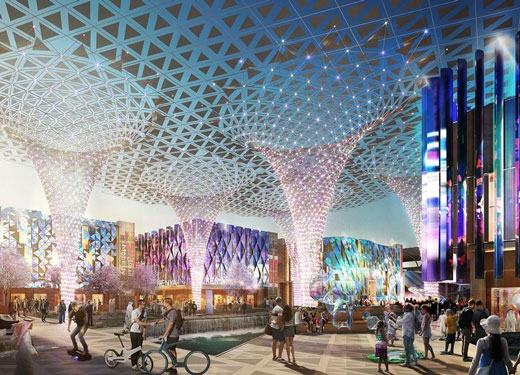Expo 2020’s multi-billion-dollar impact revealed

Expo 2020 Dubai’s economic impact has been revealed in a new report published ahead of the landmark event
As Dubai prepares to host the first ever World Expo staged in the Middle East and North Africa (MENA) region, a new report has revealed the extent of the mega-event’s impact on the UAE economy, and the legacy it will leave in terms of Dubai’s long-term growth and development.
The EY report, entitled ‘The economic impact of Expo 2020 Dubai’, predicts the total gross value added (GVA) to the UAE economy as a result of the event’s staging will be AED122.6 billion ($33.4 billion) for the period spanning 2013 to 2031.
During this time, the event is also expected to support approximately 905,000 full-time jobs in the country.
In tabling the findings, the report considered ‘direct’ increases in economic activity, ‘indirect’ benefits of increased supply chain demand and ‘induced’ benefits from increased spending by employees of firms involved in Expo 2020.
Speaking at the launch of the report, Najeeb Mohammed Al-Ali, executive director of the Dubai Expo 2020 Bureau, said the findings highlighted Expo 2020’s importance in terms of attracting and retaining investment in the UAE.
"Not only will the event encourage millions around the world to visit the UAE in 2020, it will also stimulate travel and tourism and support economic diversification for years after the Expo, leaving a sustainable economic legacy that will help to ensure the UAE remains a leading destination for business, leisure and investment," he added.
Expo 2020 Dubai is expected to attract 25 million visits and participants from 190 countries during its six-month duration spanning October 2020 to April 2021. During this period, the World Expo is expected to contribute approximately 1.5 percent of the UAE’s annual forecast GDP.
Expo 2020 organisers have confirmed the event will host more than 200 participants, comprising country exhibitors, corporations, multinational organisations and educational institutions.
Commenting on the report’s findings, Matthew Benson, partner, Transaction Advisory Services, MENA at EY, said: "Expo 2020 is an exciting long-term investment for the UAE, and is expected to have a significant impact on the economy and how jobs are created directly and indirectly. As the host, Dubai aims to use the event to further enhance its international profile and reputation. The event will celebrate innovation, promote progress and foster cooperation, and entertain and educate global audiences."
As part of Dubai’s push to become the region’s capital of innovation and a hub for entrepreneurs, Expo organisers are also prioritising contracts for small- to medium-enterprises (SMEs).
The Mohammed Bin Rashid Fund (MBRF), which is the financial arm of Dubai SME, provided direct financial assistance worth a total of AED14 million to 18 entrepreneurial projects in 2018, representing an increase of 147% compared to 2017.
According to the EY report, SMEs have received an estimated AED 4.7 billion in investment in the lead up to Expo, creating around 12,600 jobs per year.
"Across the period of our study, spanning the Pre-Expo, During-Expo and Legacy phases between 2013 and 2031, Expo 2020 is expected to support billions of dirhams of Gross Value Added and thousands of jobs in the UAE,” commented Jamie Torrens, director, Economic Advisory, Transaction Advisory Services. “Although the Expo event lasts less than a year, the positive economic impact continues far beyond the event."
In the years following Expo’s staging, the Expo site will be redeveloped and renamed
District 2020, with 80% of the existing site to be retained and used as a base for fostering innovation.
Eventually, District 2020 is expected to be a city within a city, covering an area of more than four million square metres. District 2020 companies will be focused on technology and innovation, including a mix of corporations and SMEs. The DEC is also expected to be a key facility in the site.



